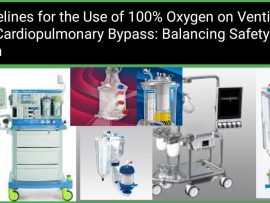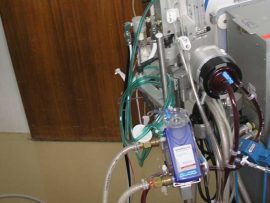Abstract Hyperoxia in pediatric cardiopulmonary bypass patients is associated with adverse effects, including reoxygenation injury, increased mortality, heightened inflammatory response, and cerebral injury. Although prior research has demonstrated a correlation..
Read MoreAbstract Background The Association between hyperoxia and mortality in patients receiving extracorporeal membrane oxygenation (ECMO) remains controversial. This study aimed to systematically evaluate the impact of arterial hyperoxia on mortality..
Read MoreAbstract Objective To compare mortality and organ injury associated with intraoperative hyperoxia and normoxia in cardiac surgery patients. Design Systematic review and meta-analysis of randomized clinical trials (RCTs). Setting Tertiary..
Read MoreAbstract BACKGROUND: Patients on venoarterial extracorporeal membrane oxygenation (VA-ECMO) are frequently managed with varying degrees of hyperoxia. Existing data suggest that higher levels of Pao2 correlate with worsened outcome in patients..
Read MoreAbstract During and after cardiac surgery with cardiopulmonary bypass, high concentrations of oxygen are routinely administered, with the intention of preventing cellular hypoxia. We systematically reviewed the literature addressing the..
Read MoreAbstract We read the interesting work of Romero‑Garcia and colleagues on the association between partial pressure of O2 in arterial blood (PaO2) and neurological outcomes in a context of acute brain..
Read MoreAbstract Abstract Objectives: To investigate whether severe hyperoxia predisposes to end-organ complications and whether these complications contribute to in-hospital mortality among cardiogenic shock (CS) patients supported in veno-arterial extracorporeal membrane..
Read MoreAbstract Background: Data is limited regarding the effects of supraphysiologic blood oxygen tension (hyperoxia) in patients requiring extracorporeal life support (ECLS). We sought to evaluate the association between hyperoxia and..
Read MoreAbstract BACKGROUND Exposure to supra-physiologic levels of oxygen has been associated with end-organ damage and worse outcomes across multiple populations related to oxidative stress and inflammation. There is limited evidence..
Read MoreIntroduction Oxygen is vital to life and a central element of cardiopulmonary support. During cardiac surgery—whether on mechanical ventilation or cardiopulmonary bypass (CPB)—100% oxygen is often used out of tradition..
Read MoreIntroduction Cardiopulmonary bypass (CPB) is a cornerstone of modern cardiac surgery, facilitating a bloodless and motionless field for surgeons. Traditionally, hyperoxia—elevated levels of arterial oxygen tension (PaO₂)—has been employed during..
Read MoreAbstract BACKGROUND: In patients receiving extracorporeal membrane oxygenation (ECMO) support, the association between arterial hyperoxia and outcomes is unclear. We performed a systematic review and meta-analysis to determine the association..
Read MoreAbstract Importance Liberal oxygen (hyperoxia) is commonly administered to patients during surgery, and oxygenation is known to impact mechanisms of perioperative organ injury. Objective To evaluate the effect of intraoperative hyperoxia compared..
Read MoreAbstract Molecular oxygen is typically delivered to patients via oxygen inhalation or extracorporeal membrane oxygenation (ECMO), potentially resulting in systemic hyperoxia from liberal oxygen inhalation or localized hyperoxia in the..
Read MoreAbstract Introduction Critically ill patients supported with venoarterial (VA ECMO) are at risk of developing severe arterial , which has been associated with increased mortality. Lower saturation targets in this population may..
Read MoreAbstract BACKGROUND: Renal ischemia and reperfusion (IR) contribute to perioperative acute kidney injury, and oxygen is a key regulator of this process. We hypothesized that oxygen administration during surgery and..
Read MoreAbstract OBJECTIVES: This review aims to: 1) identify the key circuit and patient factors affecting systemic oxygenation, 2) summarize the literature reporting the association between hyperoxia and patient outcomes, and..
Read MoreAbstract Oxygen is toxic across all three domains of life. Yet, the underlying molecular mechanisms remain largely unknown. Here, we systematically investigate the major cellular pathways affected by excess molecular..
Read MoreAbstract Background The mortality rate for a patient with a refractory cardiogenic shock on venoarterial (VA) extracorporeal membrane oxygenation (ECMO) remains high, and hyperoxia might worsen this prognosis. The objective..
Read MoreAbstract The excellent work by Rezoagli [1] on behalf of the CENTER-TBI and OxENTER-TBI consortia contributes further evidence of the potentially harmful effects of hyperoxia after traumatic brain injury (TBI)...
Read MoreAbstract Background: The mortality rate for a patient with a refractory cardiogenic shock on venoarterial (VA) extracorporealmembrane oxygenation (ECMO) remains high, and hyperoxia might worsen this prognosis. The objective of..
Read MoreAbstract During refractory cardiogenic shock and cardiac arrest, veno‑arterial extracorporeal membrane oxygenation (VA‑ECMO) is used to restore a circulatory output. However, it also impacts significantly arterial oxygenation. Recentguidelines of the..
Read MoreAbstract Objective To describe the current nationwide perspectives and practice regarding intraoperative oxygen titration in cardiac surgery. Design Prospective, observational survey. Setting Hospitals across the United States. Participants Cardiovascular anesthesiologists..
Read MoreAbstract Background: To investigate the impact of hyperoxia that developed immediately after extracorporeal membrane oxygenation (ECMO)-assisted cardiopulmonary resuscitation (ECPR) on patients’ short-term neurological outcomes after out-of-hospital cardiac arrest (OHCA). Methods:..
Read MoreAbstract OBJECTIVES: To determine potential risk factors for severe hemolysis during pediatric cardiopulmonary bypass and examine whether supraphysiologic levels of oxygen and cardiopulmonary bypass duration are associated with hemolysis. DESIGN: ..
Read MoreAbstract Background To investigate the impact of the dynamic oxygenation status on the incidence of acute kidney injury (AKI) in patients undergoing cardiopulmonary bypass. Methods This retrospective study was performed..
Read MoreAbstract Background. Hyperoxia has long been perceived as a desirable or at least an inevitable part of cardiopulmonary bypass. Recent evidence suggest that it might have multiple detrimental effects on..
Read MoreAbstract Purpose Historically, cardiac surgery patients have often been managed with supraphysiologic intraoperative oxygen levels to protect against the risks of cellular hypoxia inherent in the un-physiologic nature of surgery..
Read MoreAbstract Background Postoperative cognitive dysfunction (POCD) is a common complication of cardiac surgery. Studies have identified potentially injurious roles for cardiopulmonary bypass (CPB) and subsequent reperfusion injury. Cognitive dysfunction has..
Read More














